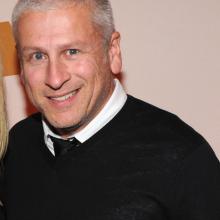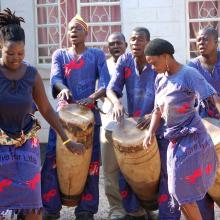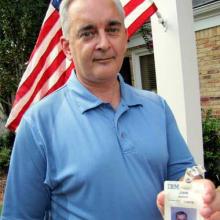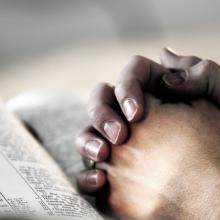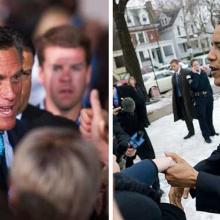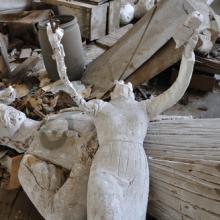Prayer
IF YOU ARE not overly familiar with the repertoire of a Leonard Cohen concert, it's hard to tell the new songs from the old. Songs from a different age sound neither anachronistic nor nostalgic, while the new echo as though they have been around forever. It's the same show night after night, with songs from the latest album, Old Ideas (released in 2012), woven into the familiar canon. Cohen tells audiences that his revivalist tour might end in two years, so that he can start smoking again by the time he turns 80.
It is a joke you know Cohen has cracked a hundred times, the kind that makes my brother call him the Jewish Dean Martin. The humor is one part of a precise choreography, whose arrangements shift from blues to waltzes to New Orleans jazz, Celtic, gospel, country, and disco, all set in the mode of Hebrew Minor and conspiring to create a vivid world that does not exist, except in paradox. Honey is the texture that comes to mind. Viscous and turbid, neither solid nor liquid. Sensual relief from the coarse, metallic world. And sweet. Sweet in the meaning of the verse from the Persian song "Navaee"—"High sweet melody, and sadness of love, dwelling in the bottom of the heart, where nobody sees"—the mixing of sorrow and transcendence into sublime paradox.
He is and has been many things to his devotees: poet, singer, writer, band leader, lover, satirist, artist, and novelist. But one thing Leonard Cohen is not is a preacher.
Prostrating and posing on bended knee, eyes knit tight, hat pulled low—he could say anything he pleases, from treatises to treason, and people would listen. Given a room and a crowd, the born preachers cannot tame the urge to climb atop the pulpit. This political instinct to prophesy and govern is noted but subdued in the opening song of Old Ideas, called "Going Home," the cry of an old man liberated from burdens of desire for love and for mission: "He will speak these words of wisdom / like a sage, a man of vision / though he knows he's really nothing / but the brief elaboration of a tube ... a lazy bastard living in a suit."
The evangelical pastor that President Obama picked to deliver the benediction at his inauguration ceremonies withdrew from the high-profile assignment on Thursday following a furor over a sermon from the mid-1990s in which he denounced the gay rights movement and advocated efforts to turn gays straight.
In a statement, the Rev. Louie Giglio of Atlanta, founder of the Passion Conferences for college-age Christians, did not directly renounce his remarks on gays but indicated that fighting gay rights is not one of his “priorities.”
Still, because of the controversy – which erupted on Wednesday after the liberal group Think Progress posted audio of the sermon – Giglio said that “it is likely that my participation, and the prayer I would offer, will be dwarfed by those seeking to make their agenda the focal point of the inauguration.”

The U.S. Capitol building at sunset. RNS photo by spleeness via Flickr (http://flic.kr/p/dvwqfk).
WASHINGTON — At a time when the ideals of compromise and collegiality seem like a distant dream in the nation’s capital, an unusually diverse coalition of religious leaders is asking Americans to pray for civility.
“Through daily prayer, we are calling on the ‘better angels of our nature’ needed to sustain our nation and solve problems,” said the Rev. Peg Chemberlin, immediate past president of the National Council of Churches and one of the faith leaders taking part in “18 days of Prayer for the Nation.”
Prayers began Thursday, the first day of the new Congress, and end on Jan. 21, the day of President Obama’s second inauguration.
Faith leaders from left, right and center have signed on, including Episcopal Presiding Bishop Katharine Jefferts Schori, Richard Land of the Southern Baptists’ Ethics, and Religious Liberty Commission and Richard Cizik, president of the New Evangelical Partnership for the Common Good.
The Faith & Politics Institute, a nonpartisan group that nurtures the spiritual life of members of Congress and their staffs and presses political foes toward civil debate, organized the days of prayer and an online “commitment to prayer” page to document participation.
Joey Ekburg, Executive Director of the North Park Friendship Center, was never one to mince words. “We pay almost twice the amount for food, and we have more clients than ever before.” It took awhile for the words to sink in and the math to play out in my head. I was never great at math, but the implications were pretty obvious.
I looked over at the people sitting near the entrance, waiting to pick up food to make it through the week. I wondered what would happen if this food pantry were to run out of food or if the unthinkable were to happen — the Friendship Center suddenly shutting its doors.
The Albany Park neighborhood in Chicago has served as an entry point for generations of immigrant families, including my own. Many of them come to America looking for a fresh start. Sometimes that search becomes reduced to finding a fresh meal.
As people of faith, it is not uncommon to pray for miracles when faced with overwhelming obstacles. For many of us, AIDS has been one of those mind-boggling, heart-wrenching causes that has wreaked havoc on the world and been the subject of many prayers.
Since the early days of the disease, the focus has been on a cure. Researchers worked tirelessly for it and the faithful asked God to provide it. But the cure has never come.
And yet, as we mark another AIDS Day this Saturday, Dec. 1, there is evidence of the miraculous.
After 24 years of commemorating this day with grim statistics and little hope, there is finally good news.
Millions of people are receiving treatment. Many fewer people are dying.
The new infection rate has dropped by 50 percent or more in 25 countries since 2001. With access to treatment, being HIV-positive is now considered a chronic disease, not a fatal one.
BACK IN 1990, the Presbyterian Church (U.S.A.) issued this warning: "The religious community must ... take seriously the risk of idolatry that could result from an unwarranted fascination with guns, which overlooks or ignores the social consequences of their misuse." Two decades later, about 660,000 more Americans have been killed by guns, with a million more injured.
These figures convince me that what was a risk in 1990 has become our reality today: For too many, guns have become idols. They claim divine status; make promises of safety and security they cannot keep; transform people and neighborhoods; create enemies; and require human sacrifice.
Not all gun owners have permitted their guns to become idols or absolutes. In fact, a recent poll shows most gun owners and NRA members, in contrast to public perception, believe personal freedom and public safety are complementary, not contradictory. But those few who hold the microphone at the NRA (the wealthy manufacturers and the gun zealots who do their bidding) have permitted their fascination for guns to supplant God and God's requirements for human community.
An idol's followers boldly claim divine status for it. Former NRA executive Warren Cassidy was clear when he boasted, "You would get a far better understanding [of the NRA] if you approached us as if you were approaching one of the great religions of the world." Not to be outdone, Charlton Heston, during a speech as NRA president, intoned, "Sacred stuff resides in that wooden stock and blued steel—something that gives the most common man [sic] the most uncommon of freedoms, when ordinary hands can possess such an extraordinary instrument that symbolizes the full measure of human dignity and liberty."
It’s here, God — Election Day in America. Today is the day when Americans everywhere are given the privilege and responsibility to exercise dominion (agency) at the polls.
Scripture tells us every human being is made in the image of God. We are, therefore, equally worthy of protection of the law. The United States Constitution and its Amendments tell us we are equally worthy of life, liberty, and the pursuit of happiness. Yet, at this very moment, laws stand poised to snatch dominion from the hands of the poor, the weak, and the vulnerable, ethnic minorities, students, and the elderly. Some scurrilous elected officials have worked behind the scenes to suppress the ability of voters to elect the person of their choice — all for the sake of politics
JERUSALEM -- Jews from Manhattan to Mozambique held prayer vigils on Monday to protest the arrest and incarceration of an Israeli feminist as she was leading 250 American Jewish women in prayer at the Western Wall.
The Oct. 16 arrest of Anat Hoffman, who co-founded Women of the Wall to enable Jewish women to pray together at the wall, has elicited outrage, especially from American Jews, the vast majority of whom do not practice Orthodox Judaism.
The wall, one of the holiest sites in Judaism, has segregated prayer sections for men and women. Israeli regulations on holy sites forbid “conducting a religious ceremony contrary to accepted practice” and “wearing unfit attire.”
Hoffman was officially arrested on charges of "disturbing public order."
THE SKIES LOOK different to me these days. The soft and tranquil clouds of my youth that often reminded me of cute Disney characters—a misty Dumbo drifting languidly overhead—have mostly been replaced by dark and threatening formations, more reminiscent of Disney’s lesser-known films, such as Godzilla vs. The Little Mermaid: This Time It’s Personal. More specific, the violently roiling skies of late are like a scene from Steven Spielberg’s War of the Worlds, where intense storm clouds heralded an alien invasion.
Which is why I always carry a prepared speech of surrender in my backpack, in case I need to immediately declare loyalty to a superior race. Although, so far, the alien presence has been pretty unimpressive, consisting mainly of crude, humanoid Kardashians attempting to assimilate quietly. One hopes that when the next prototypes arrive, they will better conceal the vaguely reptilian features of their planet’s indigenous life forms. Not to mention vice presidential hopeful “Paul Ryan,” whose hairline displays the telltale widow’s peak once thought to be a unique facial characteristic of earthly vampires, until NASA rovers spotted it on a rock on Mars. (Mars reportedly privatized its health care for seniors decades ago, and just look at the place now: not an elderly person in sight.)
BUT WHAT WAS I talking about? Oh yes, the weather. The typical forecast this summer included phrases such as “hurricane-force winds,” “damaging hail,” and “start hoarding toilet paper.” Of the four mature trees in our yard, only one remains, having survived repeated gale-force winds through pluck and attitude, although having a trunk the circumference of a grain silo probably helped. (I could never get my arms around it for a hug, back when I used to do that sort of thing.)
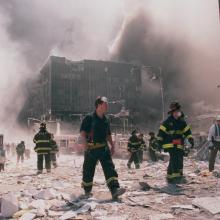
Photo via Anthony Correia / Shutterstock.com
Good and gracious God,
Today we come before you with heavy hearts
as we remember the events of 9/11.
For some of us today is a mixed bag of emotions.
We hurt deeply for those who lost their lives
and those who lost their loved ones.
We mourn the nearly 3000 who died that day.
We are humbled by the bravery of the first responders.
We continue to grieve with our neighbors
in the loss of our national innocence -
our false sense of constant safety.
Out of the chaos, to the rhythm of the Lord’s Prayer, John Mahony, a retired U.S. Army colonel who was managing projects for Blue Cross/Blue Shield, sensed something that reminded him of when his mother would wrap him up as he’d climb out of a cold swimming pool, and he would be held, safe and warm, in loving arms.
“As I walked down that stair, somewhere between the 12th floor and the 10th, somewhere between ‘Our Father’ and ‘Thy will be done,’ that same feeling came over me," Mahony said. "Suddenly, I was wrapped in warmth, and love, and comfort. In that smoky, wet stairway, in a burning building, surrounded by a thousand frightened people; I felt wonder. I felt God’s peace, and I knew that regardless of the physical outcome, everything would be all right.”
In their annual Labor Day statement, the U.S. Catholic bishops call for “national economic renewal that places working people and their families at the center of economic life.” Issued by Bishop Stephen Blaire of Stockton, Cal., chair of the Committee on Domestic Justice and Human Development, the statement emphasizes the reality that “Millions of Americans suffer from unemployment, underemployment or are living in poverty as their basic needs too often go unmet. This represents a serious economic and moral failure for our nation.”
The bishops then cite related issues in the news.
On the deficit:
“Public officials rightfully debate the need to reduce unsustainable federal deficits and debt. In the current political campaigns, we hear much about the economy, but almost nothing about the moral imperative to overcome pervasive poverty in a nation still blessed with substantial economic resources and power.”
The evening was warm. Seated at the small desk by the windows I opened my Bible and started to read from Jeremiah, "Seek the welfare of the city to which I send you." The passage was also inscribed over the entrance to the cloisters of Richmond Hill, the old convent turned retreat center in the Church Hill neighborhood of Richmond, Va., overlooking downtown. I was on retreat and seeking a little inspiration.
Seek the welfare of the city, said Jeremiah. Pray for the city, say the people of Richmond Hill. Love the city. Work for the good of the city. This is the city of God. Every city is the Holy City.
The verse from Jeremiah actually continues on. It's a bit more involved than the brief passage inscribed over the entryway:
"But seek the welfare of the city
to which I have sent you into Exile,
and pray to the Lord on its behalf,
for in its welfare you will find your welfare." (Jer. 29:7)
Oh no ... I'm gonna have to work this out.
Missourians will vote on Tuesday on a proposed amendment to the state constitution that supporters say would protect residents' right to pray in public. If a recent poll is any indication, it could pass by a mammoth margin.
Supporters say the so-called "right to pray" ballot measure — known as Amendment 2 — better defines Missourians' First Amendment rights and will help to protect the state's Christians, about 80 percent of the population, who they say are under siege in the public square.
Opponents, meanwhile, say that the religious protections Amendment 2 would offer are already guaranteed by the Bill of Rights and the U.S. Constitution, and that it will open the door to all manner of unintended and costly consequences including endless taxpayer-funded lawsuits.
President Obama and his likely GOP challenger Mitt Romney called for prayers and reflection after a deadly shooting at a Colorado movie theater, while liberal religious leaders called for stricter gun control laws.
Police have identified James Holmes, 24, as the man who opened fire at a midnight showing of the new Batman movie The Dark Knight Rises, killing at least 12 and wounding 59 others in Aurora, Colo.
President Obama cut short his campaign trip in Florida, instead delivering a brief address in Fort Myers. “There are going to be other days for politics,” Obama said. “This, I think, is a day for prayer and reflection.”
Obama touched on the fragility of life, his concerns as the father of two young daughters, and urged Americans to "spend a little time thinking about the incredible blessings that God has given us."
Loving God,
Darkness has covered our nation and thick darkness has descended upon our people. Tragedy has clouded out the light. Shots rang out in Aurora, Colorado. Some people were wounded by gas and bullets. Others were murdered.
In this time of darkness may your resilient light shine forth.
May your light shine on the family and friends of the 12 people who were killed during this senseless crime. There's no way to explain the darkness that indiscriminately murders children, women, and men. They were each someone's son, daughter, mother, or father — and nobody can fully understand the immense grief and righteous anger of their loved ones. They need your light, Loving God. Please pour it forth....
Rather than mine being a theology of “Jesus died for your sin,” mine is one of “Thy Kingdom come.” That is archaic language, and I find that a little off-putting, yes, but given that it’s from the Lord’s Prayer, attributed to Jesus, I think it’s worth wrestling with. Basically, I share the interpretation of this line of the prayer with many seekers of social justice, like MLK, Walter Rauschenbusch and the like, who believe that the line, “Thy Kingdom come, Thy will be done, on earth as it is in heaven,” is an expression of longing, for God’s love to be fully realized, for our inequities and brokenness to be reconciled here on this earth, and not just some day after we die.
This is not likely something at which we will entirely arrive in this life, but it is something toward which we should re-orient ourselves daily, in order to seek it out, actively and vocally, in all we do. This, I believe, is Christ’s call to the world.
Good and gracious God,
Today, like the rest of the world,
when I woke I wrapped myself in myths.
They are comfortable and warming in what can seem like such a cold world.
Yes, they are old and worn but they are familiar
and even the most fashion forward find comfort in this thread-worn garb.
They tell me that while it may not be fair
that 1,600 children die from hunger everyday,
I can do nothing about it.
They silence my own judgment of myself
when I put a quarter in the cup of a homeless man
as I walk on by the lack in his life
to live into the abundance of mine....
A new survey of medical patients found that prayer — with their physician — is for many an important part of the treatment process.
According to American Medical News:
About two-thirds of patients believe doctors should know about their spiritual beliefs, said a survey of nearly 500 adults from Florida, North Carolina and Vermont in the January 2003 Journal of General Internal Medicine.
One in five patients likes the idea of praying with the doctor during a routine office visit, while nearly 30 percent want to do so during a hospital stay, the study found. Half of patients would want to pray with the doctor in a near-death scenario.
About 75 percent of physicians say patients sometimes or often mention spiritual issues such as God, prayer, meditation or the Bible, said an April 9, 2007, article in Archives of Internal Medicine.
The question of whether it is appropriate for doctors to pray with patients was addressed in late May at a three-day conference organized by the University of Chicago Program on Medicine and Religion.
G. Richard Holt, MD, MPH, a recently retired otolaryngologist, gave a presentation reviewing his perspective as a head-and-neck surgeon.
During his 40-year career, Dr. Holt received about one or two prayer requests a month. He made it his practice to remain silent while the patient, a family member or religious leader prayed aloud. But Dr. Holt drew the line at initiating or leading prayer.
Read the article in its entirely HERE.
I have been discovering more each day how much I love Muslim people. They are beautiful, warm people, yet we are afraid of them because of misconceptions based on our stereotypes of their race.
I have friends who were living in the Middle East for four years and were sharing about how amazing they find Muslim people. Through my own encounters and my friend’s experiences, here’s what muslim people have taught me.

